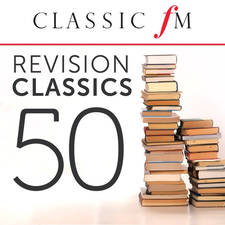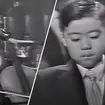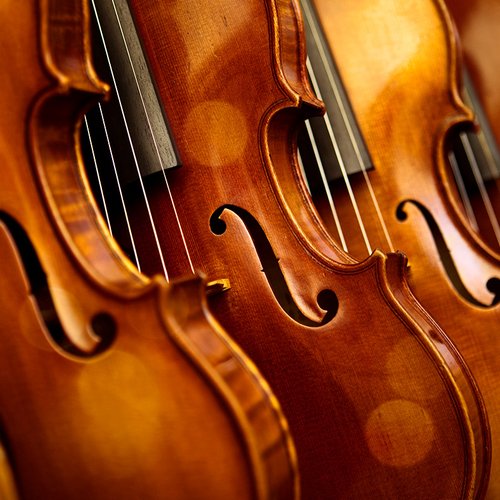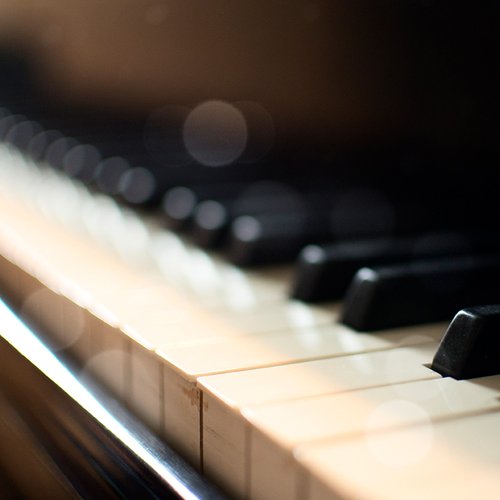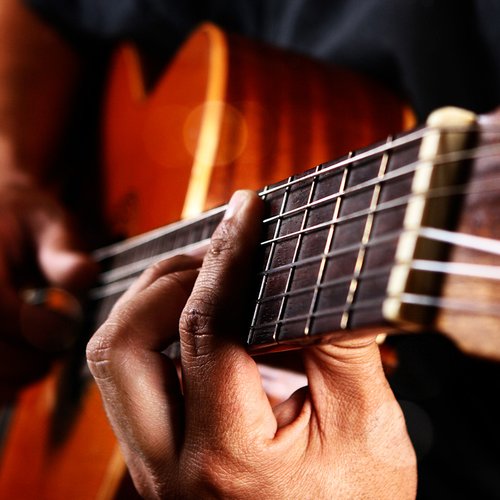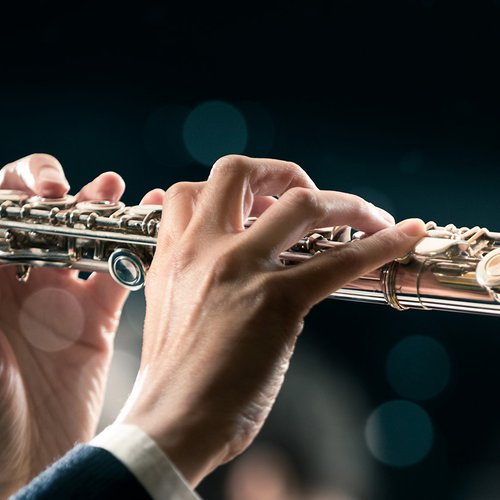The 15 greatest violin concertos of all time, ranked
17 January 2024, 16:27
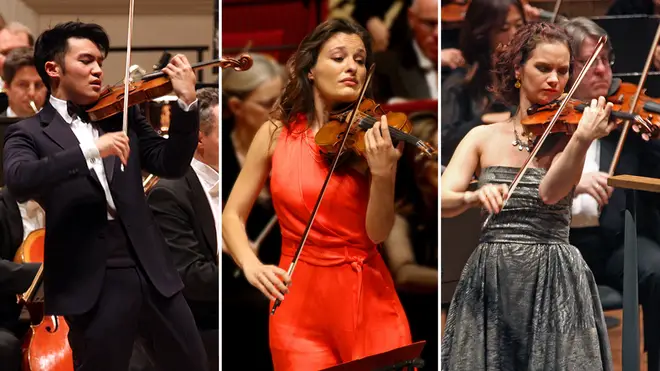
We rank the all-time great, most stirring violin concertos… from Bruch and Beethoven, to Mozart and Marsalis, here are the very best.
Listen to this article
The violin is one of the most expressive instruments in the orchestra, capable of conveying everything from anguish and heartbreak to pure, unadulterated joy, on just four strings.
And when placed in the hands of a world-class soloist, a whole new range of emotions is unlocked.
Whether you’re looking for a rousing violin anthem or a piece to make you feel everything all at once, you’re bound to find a new favourite in this list of the greatest violin concertos of all time.
Read more: The 25 greatest violinists of all time
-
Chevalier de Saint-Georges – Violin Concerto No.9 in G major
Joseph Bologne, Chevalier de Saint-Georges lived one of the most remarkable lives of the 18th century. Champion fencer, virtuoso violinist, enterprising conductor and composer, and soldier in the French Revolution, Saint-Georges somehow squeezed in the time to write 14 violin concertos, two symphonies, and much more.
His violin concerto opens with a lively and lengthy first movement, before a brief, sombre yet majestic turn in the second, and a dance-like finale that will get toes tapping everywhere.

Joseph Bologne, Chevalier De Saint Georges: Violin Concerto Op. 8 No. 2 in G major
-
Elgar – Violin Concerto
Like many of his other works, Elgar’s exquisite Violin Concerto was immensely popular at the time of its premiere in 1910.
Its grand statements, sweeping Romantic strings and rich harmonies make it one of the most beautiful violin concertos ever written.
It’s also one of the most difficult. So difficult, in fact, that Elgar’s own expertise as a violinist wasn’t enough, and he had to call on his friend and fellow violinist, Billy Reed, for technical advice.
Once completed, Elgar knew he had a smash hit on his hands, declaring in a letter: “It’s good! Awfully emotional! Too emotional, but I love it.”

R. Capuçon: Violin Concerto, Elgar
-
Price – Violin Concerto No.2
One of the final pieces she ever wrote, just three months before she died, Price’s Violin Concerto No.2 is a virtuosic piece of symphonic proportions.
In a single movement, just 15 minutes long, Price crams in drama, romance, tranquility and a jovial, carefree feeling, with all the colourful orchestral sounds you’d expect from a mid-20th century orchestral epic.
Price wrote her valedictorian work in 1952, when it was premiered – and promptly lost.
The manuscript was rediscovered in 2009, when a dilapidated property just outside of St Anne, Illinois was cleared out. It had previously served as Price’s summer house, and dozens of her works were discovered there, including both violin concertos and her fourth symphony.
Read more: 10 of Florence Price’s all-time best pieces of music

Price: Violin Concerto No. 2
-
Dvořák – Violin Concerto
Dvořák was inspired to write his only Violin Concerto after meeting the most legendary virtuoso violinist of the 19th century, Joseph Joachim.
Completed in 1879, Dvořák dedicated the work to the champion fiddler – a gesture of great respect and admiration. The feeling wasn’t reciprocated, it would seem.
Joachim never said as much in public, but behind closed doors it was whispered that he was secretly unhappy with just how much Dvořák had meddled with the concerto’s structure, and would never perform the piece.
It was eventually premiered in 1883 by František Ondřiček, while Joachim was busy “editing the solo part”. A fine excuse.

Kyung Wha Chung plays Dvořák violin concerto
-
Shostakovich – Violin Concerto No.1
Emotionally charged and imbibed with all the rage, heartbreak and desperation of a silenced composer, Shostakovich’s Violin Concerto No.1 is arguably one of the most important works of the Soviet era, as well as being an achingly beautiful piece of music.
Shostakovich wrote this piece in 1947-1948, but had to keep it filed away under lock and key while he was denounced by the Russian State.
It remained unpublished until Stalin’s death in March 1953, and eventually received its premiere in 1955 by the legendary violinist David Oistrakh, to whom the concerto was dedicated.
Oistrakh himself commented on the “depth of its artistic content”, and described the solo violin part as “Shakespearean”.
Read more: Kid string quartet plays terrifyingly virtuosic Shostakovich on Norway’s Got Talent

Shostakovich - Violin Concerto No 1 Hilary Hahn/Mariss Jansons BPO
-
Philip Glass – Violin Concerto
Philip Glass’ hypnotic minimalism is on fine form, in what might be one of his most deeply personal works.
At times reflective and commemoratory, at others playful and optimistic, the work was written in memory of the composer’s late father, who had died 16 years earlier.
Glass says: “I wrote the piece in 1987 thinking, let me write a piece that my father would have liked. A very smart nice man who had no education in music whatsoever, but the kind of person who fills up concert halls.
“It’s popular, it’s supposed to be – it’s for my Dad.”
Read more: Ukrainian pianist plays Philip Glass as Russian forces advance

Philip Glass - Violin Concerto
-
Mozart – Violin Concerto No.3
In 1773, 17-year-old Mozart was employed as a court musician in his hometown of Salzburg, now in Austria. Showered with opportunities to write everything from string quartets to choral masses, the young composer discovered a penchant for violin concertos.
He smashed out five concertos for the instrument in 1775 – and never wrote another in his life.
No matter though, because the violin concertos he did write are magnificent. The third in particular shines with a youthful jubilance, and masters the art of complex musical writing made to sound beautifully simple, unveiling the composer’s child prodigy beginnings.
Read more: Did a teenage Mozart really transcribe Allegri’s Miserere?

MOZART, Violin Concerto No.3 - Julia Fischer
-
Marsalis – Violin Concerto
Wynton Marsalis’ Violin Concerto is one of those pieces of music that just oozes its composer’s personality, humour, and greatest influences through every single note.
Breaking from the traditional concerto format, the four movements are each titled ‘Rhapsody’, ‘Rondo Burlesque’, ‘Blues’ and ‘Hootenanny’, giving you a bit of a clue as to what you can expect!
The concerto takes inspiration from Marsalis’ own background and that of Scottish violin sensation Nicola Benedetti, for whom the concerto was written. Benedetti premiered the concerto in London in 2015, and described working with Marsalis on the violin concerto as “life-changing”.
Feast your ears on this heady concoction of classical and jazz music, New Orleans blues, Celtic folk songs, gospel and African rhythms. Stomping boots at the ready...

Marsalis: Violin Concerto in D Major - 4. Hootenanny
-
Sibelius – Violin Concerto
If you only write one concerto in your lifetime, it had better be a good one – and Sibelius’ is one of the very best.
At least, that’s how it’s regarded today; unfortunately, the audience at the 1904 premiere didn’t share our opinion.
A series of unfortunate decisions by the composer led to a somewhat disastrous first performance. First, he switched his soloist at very short notice from a renowned violinist to a violin tutor at the nearby Helsinki Institute of Music, and then he procrastinated completing the work so much that his new soloist had barely any time to learn it.
Sibelius left the concert licking his wounds and made some significant revisions to create the masterful version we know and love today.
Revel in the virtuosity, pulsating excitement and pure vitality of one of Finland’s finest exports...

Sibelius: Violinkonzert ∙ hr-Sinfonieorchester ∙ Augustin Hadelich ∙ Andrés Orozco-Estrada
-
Brahms – Violin Concerto
Much like Sibelius, Brahms only wrote one Violin Concerto – because why would you want to meddle with perfection?
Brahms leaned heavily on his good friend and virtuoso violinist Joseph Joachim for help on the technical aspects of the piece. Notoriously impatient, the composer thought the trivial details of bow markings and performance directions beneath him, and delegated these to his friend.
The violinist was thanked graciously for his contributions by Brahms, who commented following Joachim’s premiere performance: “It was a lot of D major – and not much else on the program.” Flattering!
Brahms’ dissatisfaction was caused by the performer’s decision to preempt the violin concerto with Beethoven’s own, which many say inspired Brahms’ work.
Other critics and violinists at the time gave mixed responses, with one saying it was written “against” the violin rather than for it, and eminent soloist Henryk Wieniawski calling it “unplayable”.
We think it’s rather good, but here’s Brahms’ concerto in the hands of a true violin master, Maxim Vengerov, so you can make your own mind up...

Maxim Vengerov plays Brahms Violin Concerto (2021)
-
Beethoven – Violin Concerto
Another one-hit violin concerto wonder from Beethoven, and yet another heroic moment in violin history from Joseph Joachim.
The work’s original premiere in 1806 didn’t quite go to plan. Taking a leaf from Mozart’s book, he was late finishing the solo part of the work and delivered it at the very last minute to his soloist Franz Clement, who was forced to sightread part of the performance.
Perhaps unsurprisingly, the concerto slipped from popularity following its premiere in 1806, but almost four decades later in 1844, a 12-year-old prodigy brought it back to the concert stage.
In a star-studded concert with the London Philharmonic Society orchestra and conductor Felix Mendelssohn, Joseph Joachim singlehandedly reversed the fate of Beethoven’s Violin Concerto, cementing it in the history books as “the greatest” German violin concerto.
Read more: Definitively the 20 greatest Beethoven works of all time

Itzhak Perlman – Beethoven: Violin Concerto (with Daniel Barenboim, Berliner Philharmoniker)
-
Tchaikovsky – Violin Concerto
Tchaikovsky wrote his first and only Violin Concerto in a state of emotional turmoil. In 1877 the composer fled to the bank of Lake Geneva in west Switzerland, to recover from the distress of his broken-down marriage.
There, he allowed his feelings to flow out through the ink of his pen onto the manuscript paper, writing some of his greatest works – the opera Eugene Onegin, his Fourth Symphony, and his Violin Concerto.
He was joined there by his pupil and probable lover Iosif Kotek, who helped to compose the work, and to whom Tchaikovsky first intended to dedicate the concerto before bowing to societal pressures.
The eventual premiere was given by Adolph Brodsky in 1881, on which renowned critic Eduard Hanslick commented it was “long and pretentious” and “odorously Russian”, continuing: “The violin was not played, but beaten black and blue.”
It’s a virtuosic workout, but one of the great concertos nonetheless!
Read more: Tchaikovsky, composer of the world’s most uplifting ballets, had crippling self-esteem issues

Tchaikovsky Violin Concerto in D major op. 35 | Ray Chen - Queen Elisabeth Competition 2009
-
Mendelssohn – Violin Concerto
Right from the very first moment this violin concerto occurred to him, Felix Mendelssohn knew he’d hit on an earworm.
Writing to his childhood friend and concertmaster of the Leipzig Gewandhaus Orchestra, Ferdinand David, in 1838, Mendelssohn said: “I should like to write a violin concerto for you next winter. One in E minor runs through my head, the beginning of which gives me no peace.”
Delicate, deeply introspective and relentlessly emotional, Mendelssohn’s intrusive melody introduces the entire concerto, striking the heart from the very first note.
It’s no wonder that the great Hungarian violinist Joseph Joachim described it as “the most inward, the heart’s jewel”, of the four great German violin concertos.
Read more: Who was Fanny Mendelssohn, the unsung composer whose music was published under her brother’s name?

Joshua Bell - Mendelssohn: Violin Concerto in E minor - Daniel Harding/Orchestre de Paris
-
J. S. Bach – Concerto for Two Violins
Whilst it’s not strictly a solo concerto like the other contenders in this list, Bach’s double violin concerto absolutely deserves its moment in the spotlight. Written around 1730, it has become one of Bach’s most famous pieces, and rightly so.
It’s short and sweet, with three movements each consisting of between three and seven minutes. But make no mistake – every single note of Bach’s is deliberate and calculated with mathematical precision.
Almost 300 years later this music is as vibrant, energised, and dynamic as the day it was written, showcasing the legend that is Johann Sebastian Bach at his most timeless.
If you’ve ever wondered why J.S. Bach is revered as one of the greatest composers of all time, here’s all the explanation you need:

Bach: Double Violin Concerto - Anne-Sophie Mutter✧Nancy Zhou✧Noa Wildschut
-
Bruch – Violin Concerto No.1
And so we arrive at the pinnacle of our list – the violin concerto to end all violin concertos, and a former No.1 in the Classic FM Hall of Fame.
Technically demanding and intoxicatingly rhapsodic, this concerto is a violinist’s Mount Everest.
Written in 1866, Bruch’s first violin concerto outshone both of his subsequent concertos, much to the composer’s displeasure.
Writing to his publisher, Bruch expressed his exhaustion at being approached by “lazy, stupid and dull” German violinists wanting to play his first violin concerto, and had begun to tell them, “Go away and once and for all play the other concertos, which are just as good, if not better.”
We politely disagree, and hereby crown Bruch’s Violin Concerto No.1 the greatest of all time.
Read more: Adorable toddler has the most beautiful reaction to Bruch’s violin concerto

Bruch: 1. Violinkonzert ∙ hr-Sinfonieorchester ∙ Hilary Hahn ∙ Andrés Orozco-Estrada
Vote for your favourite violin concerto in the Classic FM Hall of Fame 2024, and be in with the chance to win one of 10 Amazon Echo Dots.
18+, UK only, T&Cs apply.
